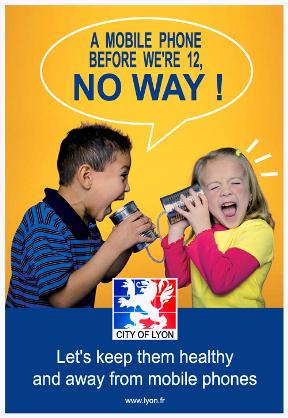Recente nieuwsberichten
Kindergsm's straks verboden wegens stralingsgevaar
- Gegevens
-
Geschreven: maandag 02 september 2013 15:13
 hln.be - Om jonge kinderen te beschermen tegen mogelijk schadelijke stralingen, is het binnenkort verboden om speciale kindvriendlijke gsm's te verkopen aan dreumesen onder zeven jaar. Dat schrijft het Nieuwsblad.
hln.be - Om jonge kinderen te beschermen tegen mogelijk schadelijke stralingen, is het binnenkort verboden om speciale kindvriendlijke gsm's te verkopen aan dreumesen onder zeven jaar. Dat schrijft het Nieuwsblad.
Het koninklijk besluit dat de verkoop van kindergsm's verbiedt, is zopas verschenen. Het initiatief gaat uit van ministers Onkelinx en Vande Lanotte. Het verbod wordt binnen zes maanden van kracht. Ook reclame voor de mobieltjes, die mikken op schoolkinderen, is dan uit den boze.
Typische kindergsm's, die slechts een paar toetsen hebben en door ouders kunnen worden voorgeprogrammeerd, zijn in ons land niet wijdverspreid. De aanbieders van de toestellen zijn misnoegd over het verbod. Zij vinden dat de verantwoordelijkheid immers bij de ouders ligt.
Zie ook:
- Enkele Brusselse gemeenten sensibiliseren kinderen en adolescenten door middel van een brochure die op school wordt uitgedeeld.

Campagne van de overheid in de Franse stad Lyon om gsm-gebruik door kinderen te ontmoedigen (meer informatie en foto's)
Wat de Russische Commissie voor Niet-Ioniserende Straling (RCNIRP) zegt over gsm-gebruik door kinderen:
"Electromagnetic fields affect not just a human health in general, but also the processes of the higher nervous activity, including behavior and thinking.
Persons under 18 years should not use mobile phones.
The current safety standards for exposure to microwaves from the mobile phones have been developed for adults and don't consider the characteristic features of the children's organism.
The following health hazards are likely to be faced by children mobile phone users in the short term: disruption of memory, decline of attention, diminishing learning and cognitive abilities, increased irritability, sleep problems, increase in sensitivity to the stress, increased epileptic readiness.
Expected (possible) health risks on the long term: brain tumors, tumors of acoustical and vestibular nerves (at the age of 25-30 years), Alzheimer's disease, acquired dementia, depressive syndrome, and other types of degeneration of the nervous structures of the brain (at the age of 50 to 60).
We believe that this risk is not much lower than the risk to the children's health from tobacco or alcohol.
We emphasize the ultimate urgency to defend children's health from the influence of mobile communication systems. We appeal to government authorities, to the entire society to pay closest attention to this coming threat and to take adequate measures in order to prevent negative consequences to the future generation's health."
Bron: open brief van Yuri Grigoryev, professor aan het Institute of Biophysics en voorzitter van het RCNIRP
|
 hln.be - Om jonge kinderen te beschermen tegen mogelijk schadelijke stralingen, is het binnenkort verboden om speciale kindvriendlijke gsm's te verkopen aan dreumesen onder zeven jaar. Dat schrijft het Nieuwsblad.
hln.be - Om jonge kinderen te beschermen tegen mogelijk schadelijke stralingen, is het binnenkort verboden om speciale kindvriendlijke gsm's te verkopen aan dreumesen onder zeven jaar. Dat schrijft het Nieuwsblad.

